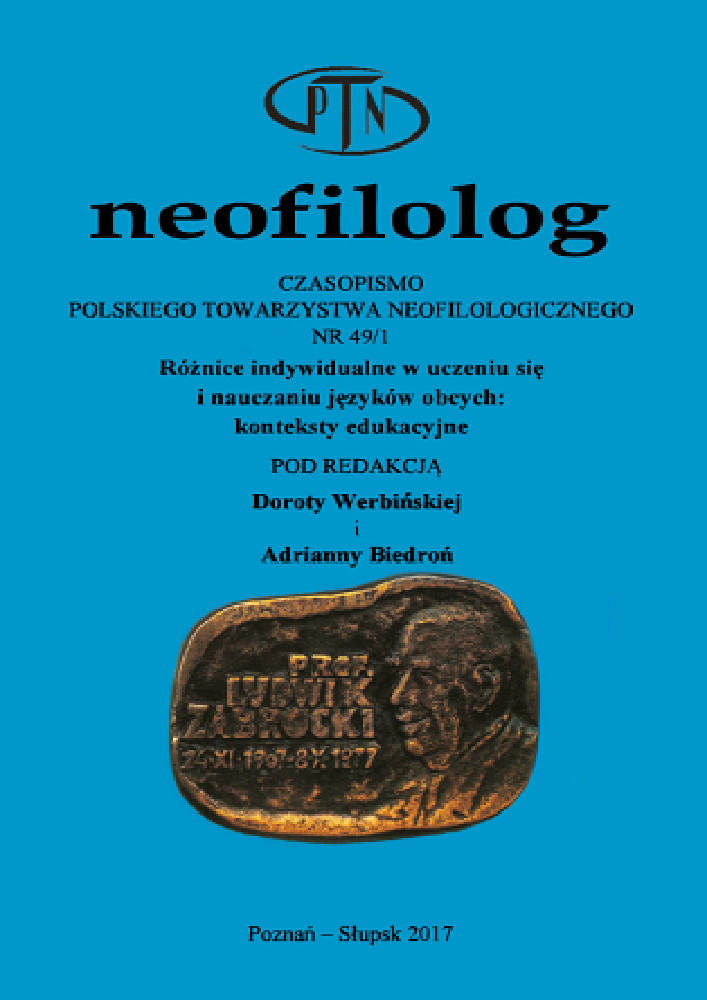Abstract
Out of all foreign languages in Polish schools Spanish has achieved the most dynamic increase in popularity within the last few years. For those most fascinated with Spanish and its culture, there have been six editions of the National Spanish Contest in Poland, organised by the Modern Language Association of Poland in cooperation with Adam Mickiewicz University’s Institute of Romance Studies. The aim of the article is to present the assumptions and activities of the contest, targeted at the most gifted students, as well as to examine the ways in which the best ones among them prepared themselves, including the amount of time they spent analysing the program guidelines. We will try to address the question whether contest finalists are truly gifted students or merely ones with high language aptitude. Special focus will be placed on finalists’ work with their teachers. We are also going to consider possible challenges and problems, which they faced during the preparation process.References
Alonso, J. A., Benito, Y. 1996. Superdotados: adaptación escolar y social en Secundaria. Madrid: Narcea, SA. De Ediciones.
Biedroń, A. 2008. ,,Teoria świadomego postrzegania (noticing). Intencja i świadomość w akwizycji drugiego języka”. (w) Autonomia w nauce języka obcego – co osiągnęliśmy i dokąd zmierzamy. (red. M. Pawlak). Kalisz: Wydział Pedagogiczno-Artystyczny UAM w Kaliszu, str. 45-52.
Carroll, J. B. 1965. ,,The prediction of success in intensive foreign language training”. (w) Training, research, and education. (red. R. Glaser). New York: Wiley, str. 87-136.
Czerwonka, D. 2010. ,,Środowisko rodzinne dzieci wybitnie zdolnych”. (w) Osobowościowe i środowiskowe uwarunkowania rozwoju ucznia zdolnego. (red. W. Limont, J. Cieślikowska, J. Dreszer). Toruń: Wydawnictwo Naukowe Uniwersytetu Mikołaja Kopernika, str. 53-61.
Dörnyei, Z. 2001. Teaching and Researching Motivation. Harlow: Pearson Education Limited.
Dörnyei, Z. 2005. The Psychology of the Language Learner. New York: Routledge.
Gardner, R. C. 1985. Social Psychology and Second Language Learning. The Role of Attitudes and Motivation. Baltimore: Edward Arnold.
Jiménez Fernández, C. 2004. ,,Alumnos superdotados: Caracterización e identificación”. (w) Diagnóstico y atención a los alumnos con necesidades educativas específicas: alumnos intelectualmente superdotados. Madrid: Secretaria General de Educación del Ministerio de Educación y Ciencia, str. 11-43.
Komorowska, H. 2002.Metodyka nauczania języków obcych. Warszawa: Fraszka Edukacyjna.
Majewska, R. 2013. ,,El alumno (super)dotado según las teorías de las diferencias individuales”. (w) El alumno de ELE: un alumno extraordinario. Marco teórico y propuestas prácticas para trabajar en la clase de Español Lengua Extranjera (ELE). (red. L. Sagermann Bustinza, J. Hadaś). Poznań. Komitet Główny Olimpiady Języka Hiszpańskiego, str. 33-49.
Mönks, F. J. 1992. ,,Development of gifted children: The issue of identification and programming”. (w) Talent for the Future: Social and Personality Development of Gifted Children: Proceedings of the Ninth World Conference on Gifted and Talented Children. (red. F. J. Mönks, W. Peters). Assen, The Netherlands: Van Gorcum, str. 191-202.
Limont, W. 2005. Uczeń zdolny. Jak go rozpoznać i jak z nim pracować. Gdańsk: GWP.
Renzulli, J. S. 1978, 2011. ,,What Makes Giftedness? Reexamining a Definition”. Phi Delta Kappan 60, 3, str. 180-184. https:/gseuphsdlibrary.files.wordpress.com/ 2013/03/what-makes-giftedness.pdf DW 13.08.16.
Rozporządzenie Ministra Edukacji Narodowej i Sportu z dnia 29 stycznia 2002 r. w sprawie organizacji oraz sposobu przeprowadzania konkursów, turniejów i olimpiad (Dz. U. nr 13, poz. 125 ze zm.).
Sękowski, A. 2001. Osiągnięcia uczniów zdolnych. Lublin: Towarzystwo Naukowe Katolickiego Uniwersytetu Lubelskiego.
Sękowski, A., Jurko, M. 2010. ,,Wybitne zdolności jako wymiar psychologiczny i pedagogiczny”. (w) Osobowościowe i środowiskowe uwarunkowania rozwoju ucznia zdolnego. (red. W. Limont, J. Dreszer, J. Cieślikowska). Toruń: Wydawnictwo Naukowe Uniwersytetu Mikołaja Kopernika, str. 11-31.
Skehan, P. 1997. Individual Differences in Second-Language Learning. London: Arnold.
Sobańska Jędrych, J., Karpeta-Peć, B., Torenc, M. 2013. Rozwijanie zdolności językowych na lekcji języka obcego. Warszawa: Ośrodek Rozwoju Edukacji.
Sternberg, R. J. 2002. „The theory of successful intelligence and its implications for language aptitude testing”. (w) Individual Differences and Instructed Language Learning. (red. P. Robinson). Amsterdam: John Benjamins B.V., str. 13-44.
Szmidt, K. T. 2013. Trening kreatywności. Podręcznik dla pedagogów, psychologów i trenerów grupowych. Gliwice: Helion.
License
Copyright (c) 2017 Małgorzata Spychała-Wawrzyniak

This work is licensed under a Creative Commons Attribution-NoDerivatives 4.0 International License.
Authors
Authors of texts accepted for publication in Neofilolog are required to complete, sign and return to the Editorial team’s office the Agreement for granting a royalty-free license to works with a commitment to grant a CC sub-license.
Under the agreement, the authors of the texts published in Neofilolog grant Adam Mickiewicz University in Poznań a non-exclusive, royalty-free license and authorize the use of Attribution-NoDerivatives 4.0 International (CC BY-ND 4.0) Creative Commons sub-license.
The authors retain the right to the free disposal of the work.
Users
Interested Internet users are entitled to use works that have been published in Neofilolog since 2017, under the following conditions:
▪ attribution – obligation to provide, together with the distributed work, information about the authorship, title, source (link to the original work, DOI) and the license itself.
▪ no derivatives – the work must be preserved in its original form. Without the author's consent, it is not possible to distribute the modified work in the form of translations, publications, etc.
Copyrights are reserved for all texts published since 2017.
Miscellaneous
Adam Mickiewicz University in Poznań retains the property right as a whole (layout, graphic form, title, cover design, logo etc.).
